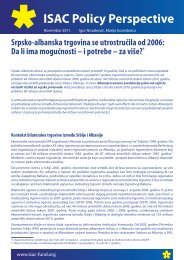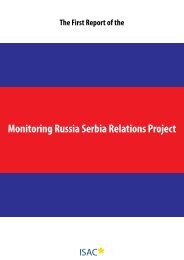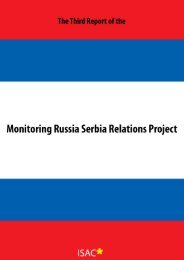the process of security sector reform - ISAC Fund
the process of security sector reform - ISAC Fund
the process of security sector reform - ISAC Fund
Create successful ePaper yourself
Turn your PDF publications into a flip-book with our unique Google optimized e-Paper software.
Dr Timothy Edmunds THE PROCESS OF SECURITY SECTOR REFORM<br />
Dr Timothy Edmunds THE PROCESS OF SECURITY SECTOR REFORM<br />
inappropriate or partisan advice – it does bring advantages. These include training<br />
for <strong>security</strong> <strong>sector</strong> personnel (including civilians) both at home and abroad – and<br />
<strong>the</strong> provision <strong>of</strong> local advisors and financial support for <strong>the</strong> <strong>reform</strong> <strong>process</strong>. This<br />
kind <strong>of</strong> technical assistance – which is available though programmes like PfP<br />
– can help to short cut domestic shortages in expertise and provide a sometimes<br />
helpful roadmap for <strong>reform</strong>.<br />
As with many first generation <strong>reform</strong>s, participation in western sponsored activities<br />
– such as sending <strong>of</strong>ficers to western staff colleges – can provide a visible<br />
demonstration <strong>of</strong> a country’s engagement in SSR which can be easily publicised.<br />
In addition, participating in peacekeeping or multinational <strong>security</strong> <strong>sector</strong> activities.<br />
These help to expose <strong>security</strong> <strong>sector</strong> personnel to <strong>the</strong> norms and operating<br />
procedures <strong>of</strong> o<strong>the</strong>r countries and are high pr<strong>of</strong>ile opportunities to communicate<br />
good practice and pr<strong>of</strong>essionalism to domestic and international audiences.<br />
Local strategies: SSR cannot be imposed from outside. While models <strong>of</strong> <strong>security</strong><br />
<strong>sector</strong> organisation from o<strong>the</strong>r countries may be useful as reference points<br />
for particular SSR programmes, it is unlikely <strong>the</strong>y will be successful if <strong>the</strong>y are<br />
used as rigid blueprints for <strong>reform</strong>.<br />
Different historical, political, structural and social legacies create environments<br />
which require specific local, context-specific strategies for <strong>reform</strong>. So, for<br />
example, <strong>the</strong> British constabulary model <strong>of</strong> policing differs greatly from <strong>the</strong> gendarmarie<br />
tradition in France, <strong>the</strong> carabineiri model in Italy. Simply transferring<br />
one <strong>of</strong> <strong>the</strong>se models from one country to ano<strong>the</strong>r is unlikely to be particularly<br />
helpful.<br />
In addition, long-term SSR entails <strong>the</strong> development <strong>of</strong> expertise, and effective<br />
mechanisms for <strong>security</strong> <strong>sector</strong> planning. In this respect, <strong>the</strong> local <strong>process</strong> <strong>of</strong><br />
developing appropriate democratic <strong>security</strong> <strong>sector</strong> arrangements can be at least<br />
as important as <strong>the</strong> policy end-point itself. Imposing an externally generated<br />
blueprint for <strong>reform</strong> avoids <strong>the</strong> (sometimes difficult) domestic <strong>security</strong> <strong>sector</strong><br />
planning <strong>process</strong>, which in itself is a fundamental part <strong>of</strong> SSR more widely.<br />
Finally, <strong>reform</strong> needs <strong>reform</strong>ers. If <strong>the</strong> SSR <strong>process</strong> is not driven from within <strong>the</strong><br />
local context <strong>the</strong>n it is likely that it will remain superficial, and will not tackle<br />
<strong>the</strong> underlying problems <strong>of</strong> <strong>the</strong> <strong>security</strong> <strong>sector</strong>. Often, <strong>of</strong> course, <strong>reform</strong>ers will<br />
be hard to find in <strong>the</strong> <strong>security</strong> <strong>sector</strong> itself – particularly if it perceives that its<br />
interests will be threatened or damaged by SSR. Under <strong>the</strong>se circumstances,<br />
it can be useful to consider where <strong>reform</strong> is happening in o<strong>the</strong>r policy <strong>sector</strong>s<br />
(such as in finance ministries for example) and about how to harness and utilise<br />
this momentum and experience to help encourage <strong>reform</strong> in <strong>the</strong> <strong>security</strong> <strong>sector</strong><br />
itself.<br />
PROBLEM AREAS<br />
SSR entails changing <strong>of</strong>ten powerful and influential institutions with established<br />
traditions, interests and agendas <strong>of</strong> <strong>the</strong>ir own. Because <strong>of</strong> this it is always likely<br />
to be challenging. There are two particular difficulties associated with SSR<br />
though that need to be recognised and cannot be avoided.<br />
First, tends to be expensive, particularly in <strong>the</strong> short to medium-terms. In <strong>the</strong><br />
long-term SSR will bring economic advantages for <strong>the</strong> reasons outlined above,<br />
but during <strong>the</strong> transitional phase pr<strong>of</strong>essionalising and downsizing <strong>the</strong> <strong>security</strong><br />
<strong>sector</strong> will <strong>of</strong>ten lead to an increase ra<strong>the</strong>r than a decrease in state budgets. If<br />
SSR is to be successful <strong>the</strong>refore it requires a realistic financial commitment<br />
from <strong>the</strong> government concerned.<br />
A second SSR problem concerns a tendency to concentrate on <strong>reform</strong> <strong>of</strong> <strong>the</strong><br />
regular armed forces, to <strong>the</strong> exclusion <strong>of</strong> <strong>security</strong> <strong>sector</strong> actors such as interior<br />
ministry forces or <strong>the</strong> intelligence services. Secretive institutions such as <strong>the</strong><br />
intelligence services are inherently more difficult for civilians to penetrate and<br />
engage with than o<strong>the</strong>r elements <strong>of</strong> <strong>the</strong> <strong>security</strong> <strong>sector</strong>. However, <strong>of</strong>ten it is<br />
<strong>the</strong>se o<strong>the</strong>r <strong>security</strong> <strong>sector</strong> actors who pose <strong>the</strong> most difficulty in relation to <strong>the</strong>ir<br />
engagement in domestic politics or <strong>the</strong>ir exclusion from democratic mechanisms<br />
for oversight and transparency.<br />
If SSR is to occur in a coherent, effective and successful manner <strong>the</strong>refore, it<br />
is critical that future <strong>reform</strong> efforts also include <strong>the</strong> more ‘difficult’ areas <strong>of</strong> <strong>the</strong><br />
SSR agenda.<br />
22 23

















